Alaska Genealogy and an Important Milestone
Alaska genealogy researchers celebrate an important milestone. It’s the 150th anniversary of the Alaska Purchase. This special commemoration includes a photography exhibit, musical program, and much more. Keep reading to learn more about resources for Alaska genealogy.
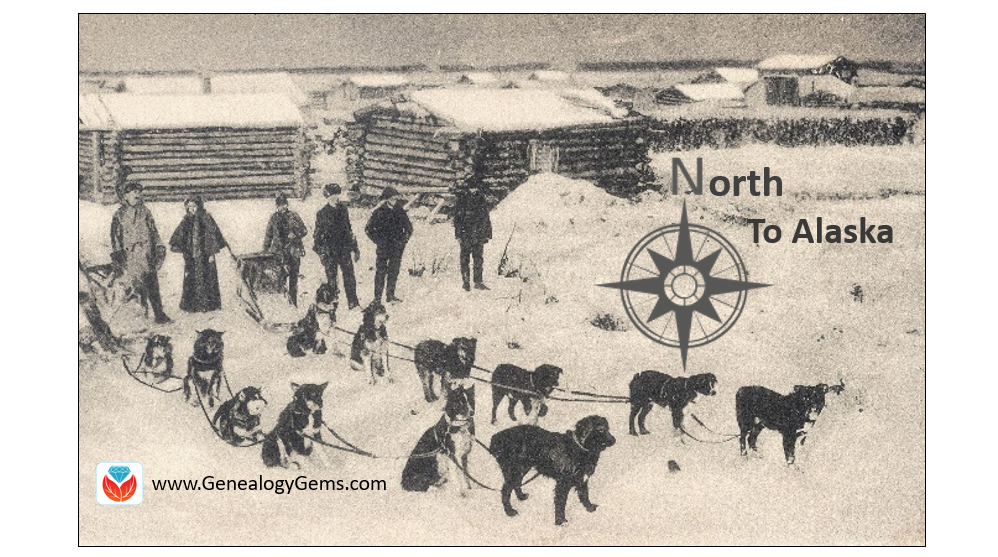
The National Archives is celebrating the sesquicentennial (150 years) of the Alaska Purchase with a special Hidden Treasure Alaska panoramic photography exhibit at the National Archives at College Park. It will also include a presentation by the exhibit curator, a musical program at the National Archives Museum in Washington, DC, and a loan to Polar Bear Garden exhibit at the Anchorage Museum. The National Archives programs and exhibit are free and open to the public.
The Musical Program
The musical program will be held on Thursday, March 30, at 7:30 p.m. at William G. McGowan Theater, Washington, DC. On March 30, 1867, U.S. Secretary of State, William Henry Seward, signed the Alaska Treaty of Cession that purchased Russian America. To commemorate the life and contributions of Seward, the State of Alaska is sponsoring a performance of the Alaska chamber group, Wild Shore New Music. Wild Shore will perform the work of living composers who have found inspiration through their experiences with the natural beauty and indigenous cultures of Alaska. Reservations are recommended and can be made online.
The Exhibit
The Hidden Treasure exhibit will be at the National Archives at College Park, MD, on the lower level. Hidden Treasure dramatically captures the beauty of Alaska, as captured on film by U. S. Geological Survey (USGS) topographers from 1910-1932. These extraordinary images of more than 6,000 panoramic photographs from the collection were used, but then stored and remained unseen for decades. Thanks to the research, work, and photographic skill of National Archives expert Richard Schneider, these images can now be seen by the public in their original panoramic format for the first time. These images capture work-life in the Alaskan wilderness, surveying techniques, towns, and geological formations, such as the Columbia Glacier. See Richard Schneider’s related Prologue Magazine story: The Alaskan Frontier in Panorama – How the National Archives Preserved Early 20th-Century Photographs.
Schneider will discuss these historic panoramic photographs of the Alaska Territory in his presentation on Wednesday, April 12th at 2 p.m. EST. You may see it live streamed at the William G. McGowan Theater & YouTube.
Polar Bear Garden
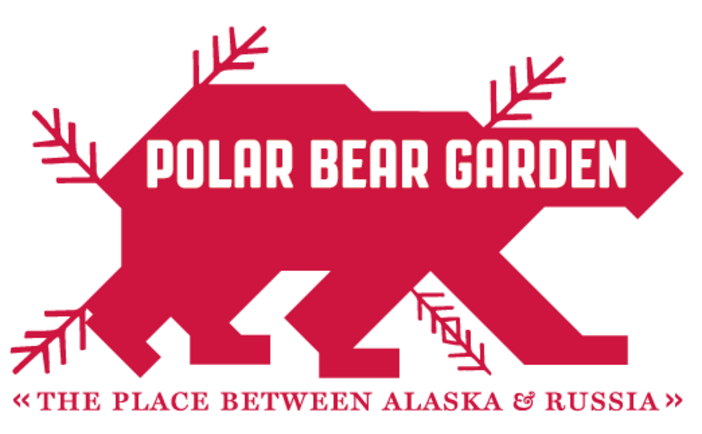 Beginning March 3rd through September 17, 2017, The Polar Bear Garden exhibit will be on display at the Anchorage Museum in Anchorage, Alaska.
Beginning March 3rd through September 17, 2017, The Polar Bear Garden exhibit will be on display at the Anchorage Museum in Anchorage, Alaska.
Archival and contemporary photographs combined with nesting dolls, cartoons, feature-length films, and Cold War propaganda will take viewers on a journey between Alaska and Russia since the purchase. It will further explore stereotypes, language, storytelling, boundaries, and crossings. The exhibit highlights are on rare loan from the National Archives and include the original cancelled check and President Andrew Johnson’s Ratification of the Treaty. More information about the Polar Bear Garden can be found online.
Alaska Genealogy
Your Alaskan heritage will likely include stories of great strength and perseverance. To begin your Alaska genealogy research, you may wish to review the FamilySearch Wiki article titled Alaska, United States Genealogy. In it, you will learn important tips like the fact that Alaska is not divided into counties, as nearly all the other states are. Instead, Alaska is divided into boroughs.
There is also a free guide on the wiki titled Step-by-Step Alaska Research, 1880-Present that you may particularly helpful. Among other things, it will help you located birth, marriage, and death records; wills and probates; and naturalization and immigration records.
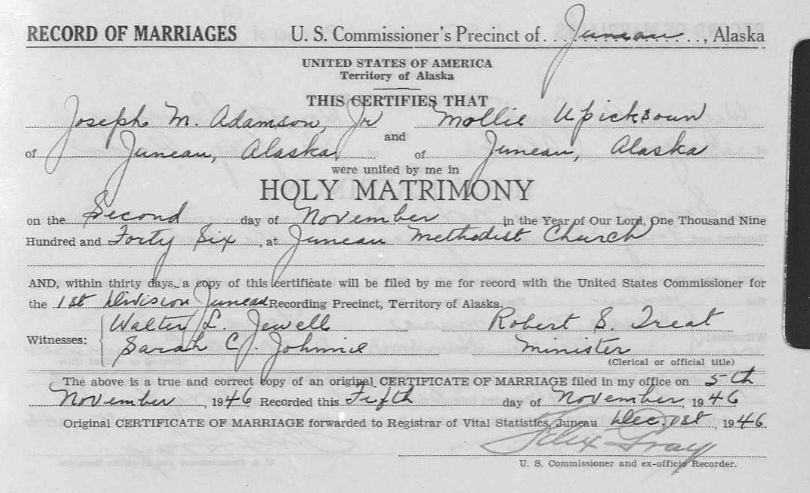
Marriage record found online at FamilySearch.org in collection titled “Alaska, Vital Records, 1816-1959”
Additionally, the Alaska State Archives have resources available. They hold many records that contain information on individuals such as:
- Naturalization records (1888-1972)
- Pioneer Home Residents (1913-1980)
- Probate Index (1883-1960)
- Teacher records (1917-1959)
- World War I Veterans (1913-1923)
- Vital Statistics (1816-1998)
Lastly, check out the Alaska Genealogy online guide provided by the Alaska State Library. This basic guide of Alaska related genealogy resources is not intended to be comprehensive, but it is certainly a step in the right direction. Sources for several of the boroughs may be available in other Alaska libraries or through interlibrary loan at your local library. They include:
- Anchorage Sources
- Fairbanks Sources
- Juneau Sources
- Kenai Peninsula Borough Sources
- Other Alaska Town
More Resources for Alaska Genealogy Research
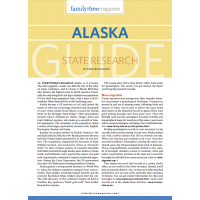 The Alaska State Research Guide Digital Download by Family Tree Magazine is a digital download you will want to have for your genealogy library. Trace your Alaska ancestors with the advice and resources in this four-page download. It includes:
The Alaska State Research Guide Digital Download by Family Tree Magazine is a digital download you will want to have for your genealogy library. Trace your Alaska ancestors with the advice and resources in this four-page download. It includes:
- a how-to article detailing Alaska history and records, with helpful advice on tracking your family there
- the best websites, books and other resources for Alaska research, handpicked by our editors and experts
- listings of key libraries, archives and organizations that hold the records you need
- descriptions of the top historic sites for learning about your ancestors’ lives and times, including visitor information
- timeline of key events in the state’s history
- full-color map to put your research in geographical context
Happy hunting…or should I say mushing!
Family History Episode 34 – Do Your Genealogy at the Public Library, Part 1
Family History: Genealogy Made Easy Podcast
with Lisa Louise Cooke
Republished June 3, 2014
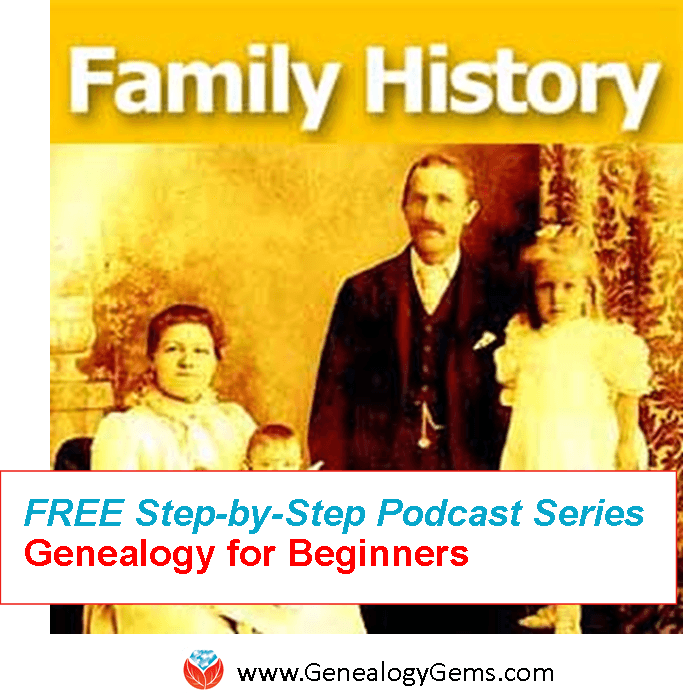
Listen to the Family History: Genealogy Made Easy podcast by Lisa Louise Cooke. It’s a great series for learning the research ropes and well as refreshing your skills.
https://lisalouisecooke.com/familyhistorypodcast/audio/fh34.mp3
Download the Show Notes for this Episode
Welcome to this step-by-step series for beginning genealogists—and more experienced ones who want to brush up or learn something new. I first ran this series in 2008-09. So many people have asked about it, I’m bringing it back in weekly segments.
Episode 34: Do Your Genealogy at the Public Library, Part 1
Did you know there is a gem of a genealogical resource right in your own backyard? Well, at least in your own neighborhood—and also in just about every neighborhood where your ancestors lived. The public library is one of the most underestimated sources of genealogical information around! It’s free. It has better hours than most government-run agencies. There are staff with research skills, knowledge of their locale and knowledge about their collections. I have invited Patricia Van Skaik, Manager of the History and Genealogy Department of the Public Library of Cincinnati and Hamilton County to join us here on the podcast. In this episode she’s going to give us the inside scoop on the unique genealogical resources that are tucked away in public libraries just waiting to be discovered.
What’s at the library?
Each library has unique materials for its locale. Examples include:
- City directories
- Maps
- Obituary indexes
- Partnerships with local societies and clubs, and organizations (access to databases)
- Unique library expertise
TIP: Check with the public libraries in each location where your ancestors lived TIP: Genealogy holdings vary, and often have to do with what local constituents want.
TIP: Get involved and make requests at your local library if you want more genealogy resources.
How to prepare for your visit
- Determine your questions ahead of time and gather the appropriate ancestor information to take with you.
- See if they have a genealogy area on the website. There are lots of things on the library website that are not in the catalogue (special exhibits, digitized images, and databases) Don’t just jump straight to the catalogue.
Search the online catalog and identify the books and resources you want
- Look for the geographic area, not the person’s surname (town, county, geographical area)
- Use the Advanced search – “you don’t have to be an advanced researcher to use the advanced search!”
- Don’t use the word “genealogy” in your search. It’s pretty useless.
4 more tips from Lisa and Patricia
Email in advance – ask some questions ahead of time:
- Is the website up to date?
- Reconfirm hours of operation
- Parking?
- What’s the best time to come for more service?
- Is wi-fi available?
- Do you need change for copy machines?
- Are there any special collections you should know about?
- Do they offer orientations?
Plan a group visit: Some libraries will make special accommodations for a group visit. Ask if they will provide a tour geared to genealogy. And they may have a meeting room where you can have lunch or meet. It’s a small investment in time and money to make sure that you’re going to get the most of the time you’re going to spend there.
Get their expertise! Librarians don’t just know the collection, but they also know research strategy, collection contents, all the questions that have come before, and local area resources.
Phrase your questions for success: Pose questions in terms of a query. For example: “I’m trying to find evidence of someone’s death during this time frame. What materials do you have that may help?” (Don’t just ask specifically for obituaries or government death records—they may not have one but they may have other resources you’re not thinking of.)
Tune in next week to Episode 35 to learn more about researching at the public library, like tips for advance searching those online card catalogs, thinking like a librarian, unique collections at librarians and the types of questions you can ask your public library staff.
Getting Genealogy Organized for Genealogy Gems Premium Members
Getting genealogy organized is just one of the topics we cover here at Genealogy Gems, and Premium Members have exclusive access to podcast and video content to help you accomplish that goal.
We’ve put together a step-by-step plan for getting the most out of Premium Membership, and going from unorganized to organized in nothing flat!

A new Gem’s reader recently sent us the following email:
Dear Lisa,
I have recently joined Genealogy Gems as a Premium member and wanted to ask if there is a good place to get started.
I have a ton of family information collected, but as yet have not figured out a plan of attack.
I was wondering if you could guide me in which podcasts, premium podcasts, and videos would be good ones to start with. I need to put this information into some semblance of order so that I can move constructively on it, as well as to be able to share the family history with others and have it make sense. Thanks, Gerri.
Getting Genealogy Organized with Premium Content
We are so glad to have you as a Genealogy Gems Premium Member. Welcome!

The best place to start is by digging into these blog posts that I highly recommend:
- The Beginning Genealogist’s Biggest Mistake and How to Fix It
- Which Way Do I Go Now? Organize a Genealogy Research Plan
- 6 Tips: How to Organize Your Family History
- How to Get Organized and Put Your Family History Household in Order
- Hard Drive Organization Part 1 and Part 2
- Use Evernote to Create a Research Plan
- Podcast episode 114: Paper Organization
- Family History: Genealogy Made Easy Podcast episodes 31 & 32: Organizing Your Genealogy Files.
Getting genealogy organized is one of the most overwhelming tasks new and seasoned genealogists deal with. Whether you’re new to Premium Membership or a long time member, make sure you have a solid basic structure for your genealogy organization, as it is the backbone of everything that follows. That basic structure for getting genealogy organized might look like this:
A Quick Plan for Getting Genealogy Organized
- Assess what you have.
- Pick a genealogy database software program. We recommend RootsMagic.
- Set-up a few 3-ring binders with acid free sheet protectors so you have a place to put documents and other important things.
- Set-up a basic folder and file structure for your hard drive based on the Premium videos Hard Drive Organization.
- Have a back-up plan for your precious family history files. We recommend BackBlaze as a way to automatically back-up your computer files.
- Sign-up for our free newsletter (if you haven’t already) to stay up-to-date on all the latest records and techniques.
- Don’t wait to be fully organized before you begin. Stay motivated by scheduling “fun” research time, as well as organization time.
- Make appointments with yourself to stay on track, and listen to the Genealogy Gems Premium Podcast while you organize.
- Regularly tap into all of the Genealogy Gems resources like what’s new in books and guides.
Like us on our Facebook page to see more genealogy ideas
Become a Genealogy Gems Premium Member
If you are not a Genealogy Gems Premium Member, take a look at what you are missing! Premium Members are able to listen to our Premium podcasts packed with even more tips and techniques for all things genealogy. You also have access to my most popular training videos.
BONUS e-book:
 For a limited time, new members will receive
For a limited time, new members will receive
this exclusive digital PDF e-book,
a collection of my most popular
articles from Family Tree Magazine!
(the e-book will be emailed to you
within 24 hours of purchase)
